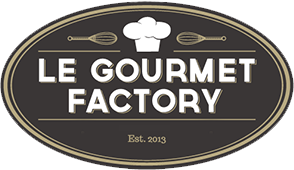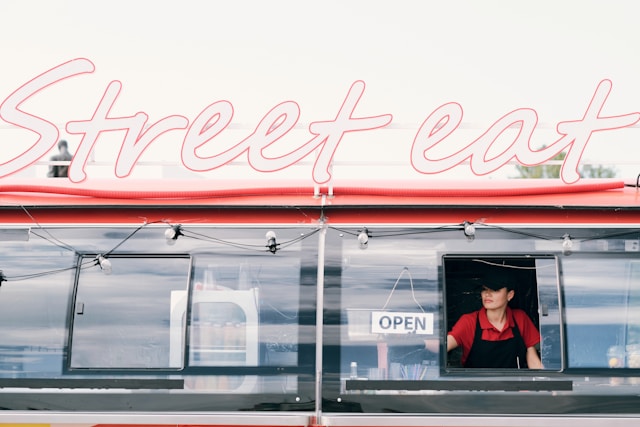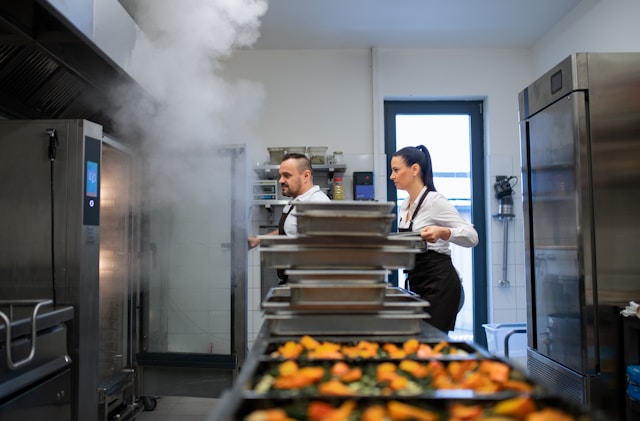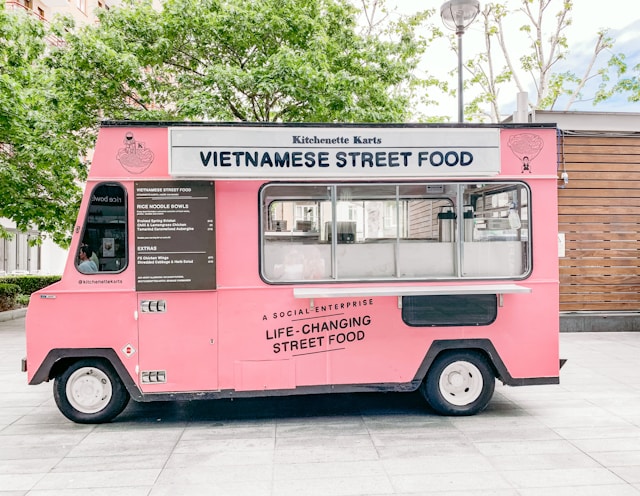Starting a Food Truck Business: Your Roadmap to Success
Start your food truck business with confidence. Learn the essential steps, from planning and funding to branding and launching successfully.
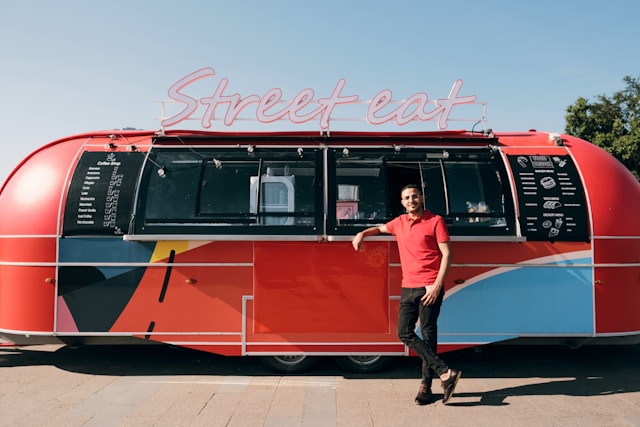
Continue exploring the next articles in this series:
Master the art of food truck setup. From choosing equipment to creating efficient layouts, this guide covers everything you need…
Discover food truck commissary costs and rentals. Learn about pricing, benefits, and tips for choosing the best facility to support…
Or navigate back to explore other related content :
Discover the essentials of the food truck business, from market relevance to success tips. Explore its potential in today’s thriving…
01: Introduction
Starting a food truck business is an exciting journey that offers creative freedom, flexibility, and the opportunity to serve delicious food to a diverse audience. However, the process involves careful planning, market research, and strategic execution. This guide will walk you through the essential steps to start your food truck business, from understanding the market to setting up operations. By the end, you’ll have a clear roadmap to launch your business with confidence.
02: Understanding the Food Truck Industry
The Growth of the Food Truck Market
The food truck industry has grown significantly over the past decade, driven by consumer demand for convenience and unique dining experiences. With an estimated market value exceeding $1 billion in the U.S. alone, food trucks are no longer seen as a trend but as a thriving segment of the food service industry.
Key Consumer Trends
Understanding what customers want is essential for success. Key trends driving the food truck market include:
- Diverse Cuisines: Customers seek innovative and authentic dishes, from gourmet tacos to vegan burgers.
- Convenience: Mobile food trucks cater to busy professionals, event-goers, and urban dwellers.
- Sustainability: Environmentally conscious consumers appreciate food trucks that use eco-friendly packaging and locally sourced ingredients.
03: Preparing to Start Your Food Truck Business
Market Research
Begin with thorough research to identify opportunities and challenges in your target market:
- Target Audience: Determine who your customers are—office workers, festival attendees, or local residents.
- Competitor Analysis: Study other food trucks in your area. What are they doing well? What gaps can your business fill?
- Location Strategy: Identify high-traffic areas, events, and neighborhoods where your food truck can thrive.
Creating a Business Plan
A well-crafted business plan is essential for setting clear goals and securing funding. Key components include:
- Mission Statement: Define your business’s purpose and values.
- Menu Concept: Focus on a unique selling point (e.g., fusion cuisine, locally sourced ingredients).
- Financial Plan: Estimate startup costs, operating expenses, and revenue projections.
04: Legal and Financial Steps
Securing Permits and Licenses
Legal compliance is a critical step in starting your food truck. Common requirements include:
- Business License: Allows you to operate legally.
- Health Permit: Ensures adherence to food safety standards.
- Parking Permits: Grants permission to park and serve in designated areas. Refer to our guide on Food Truck Business Permits for more details.
Funding Your Food Truck Business
Starting a food truck requires an initial investment, typically ranging from $50,000 to $200,000. Explore funding options such as:
- Personal Savings: Self-fund your business if possible to retain full ownership.
- Small Business Loans: Secure a loan from a bank or financial institution.
- Crowdfunding: Leverage platforms like Kickstarter to raise funds from your community.
05: Setting Up Your Food Truck
Purchasing or Leasing a Food Truck
Decide whether to buy or lease your food truck. Factors to consider include:
- Budget: Buying requires more upfront capital, while leasing spreads costs over time.
- Customization: Ensure the truck meets your kitchen and branding needs.
- Condition: Inspect for mechanical and kitchen equipment quality before finalizing.
Designing Your Menu
Your menu is the centerpiece of your food truck business. Tips for success include:
- Simplicity: A streamlined menu improves efficiency and reduces waste.
- Signature Dishes: Offer standout items that customers will remember.
- Cost Analysis: Calculate the cost of ingredients to ensure profitability.
Equipping Your Truck
Equip your truck with the tools needed for efficient operations. Essential equipment includes:
- Cooking appliances (e.g., grills, ovens, fryers).
- Refrigeration and storage units.
- Ventilation and fire safety systems.
07: Building Your Brand
Creating a Strong Brand Identity
Your branding should reflect your business’s personality and appeal to your target audience. Key elements include:
- Logo and Truck Design: Use eye-catching visuals to stand out.
- Tagline: Create a memorable slogan that communicates your unique value.
- Social Media Presence: Build an online following by sharing updates, photos, and promotions.
Marketing and Promotions
Effective marketing strategies help attract and retain customers:
- Social Media Campaigns: Announce your locations and menu updates regularly.
- Partnerships: Collaborate with local events, breweries, or businesses.
- Loyalty Programs: Offer discounts or rewards for repeat customers.
07: Launching Your Food Truck Business
Hosting a Grand Opening
A grand opening is a great way to create buzz and attract customers. Tips include:
- Offer special promotions or discounts.
- Partner with local influencers or media outlets to spread the word.
- Use social media to build anticipation and share live updates during the event.
Gathering Feedback
After launching, gather feedback to improve your offerings and operations:
- Conduct surveys to learn what customers love and what needs improvement.
- Use online reviews to identify strengths and address concerns.
07: Next Steps in Your Food Truck Journey
Starting a food truck business is an exciting and rewarding endeavor, but success requires careful planning and execution. Now that you understand the steps to get started, it’s time to explore more specific aspects of your journey:
Food Truck Business: 10 Things to Consider Before You Start: Learn the critical factors to evaluate before taking the leap.
Food Truck Setup: Discover how to set up your truck for maximum efficiency and success.
Food Truck Commissary Costs and Rentals: Understand the role of commissary kitchens in your operations.
With determination, creativity, and strategic planning, your food truck business can become a thriving venture.
- FAQ
fREQUENTLY ASKED QUESTIONS
How much does it cost to start a food truck business?
Startup costs range from $50,000 to $200,000, depending on the truck, equipment, and permits required.
What permits are needed to start a food truck?
Common permits include a business license, health permit, and parking permits. Check local regulations for specific requirements.
How do I fund my food truck business?
Funding options include personal savings, small business loans, or crowdfunding platforms like Kickstarter.
What should I include in my food truck business plan?
Your plan should cover market research, menu concepts, financial projections, and a marketing strategy.
Where can I learn more about starting a food truck?
Explore our guides on Food Truck Setup and Commissary Costs and Rentals for in-depth insights.
Continue exploring the next articles in this series:
Considering starting a food truck? Learn the 10 essential factors to ensure success, from planning and budgeting to branding and…
Master the art of food truck setup. From choosing equipment to creating efficient layouts, this guide covers everything you need…
Discover food truck commissary costs and rentals. Learn about pricing, benefits, and tips for choosing the best facility to support…
Or navigate back to explore other related content :
Discover the essentials of the food truck business, from market relevance to success tips. Explore its potential in today’s thriving…
- 176A South Van Brunt Street Englewood, NJ 07631
Copyright © 2023 Le Gourmet Factory. All Rights Reserved. Website Design, SEO and Internet Marketing by Creative Click Media.
